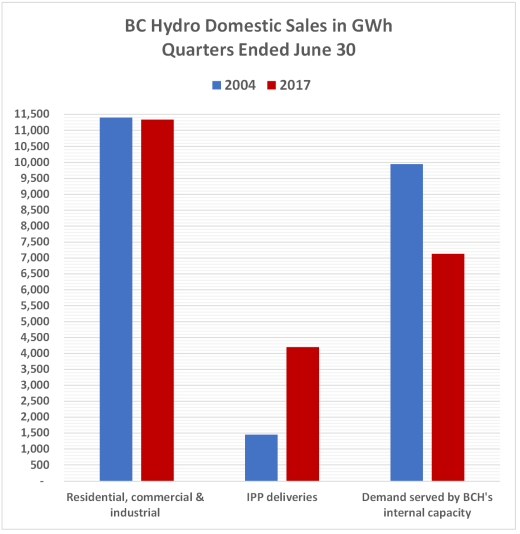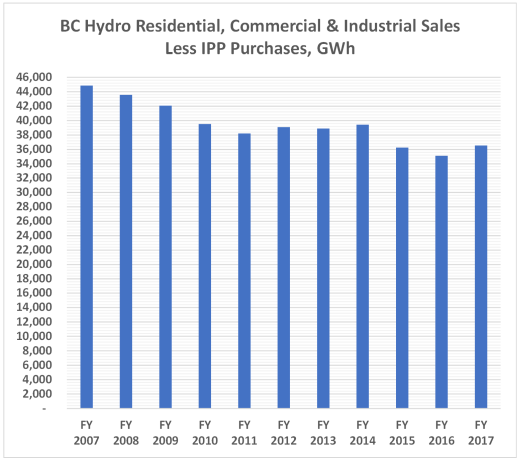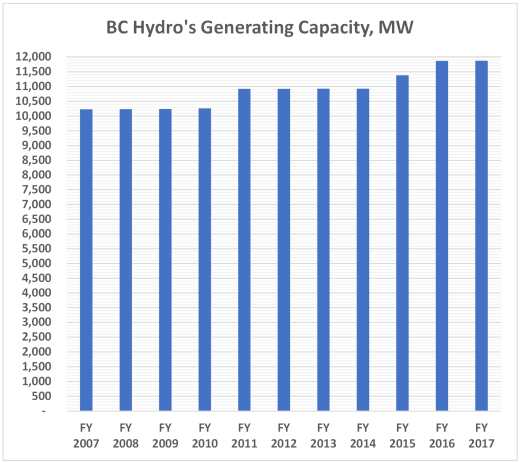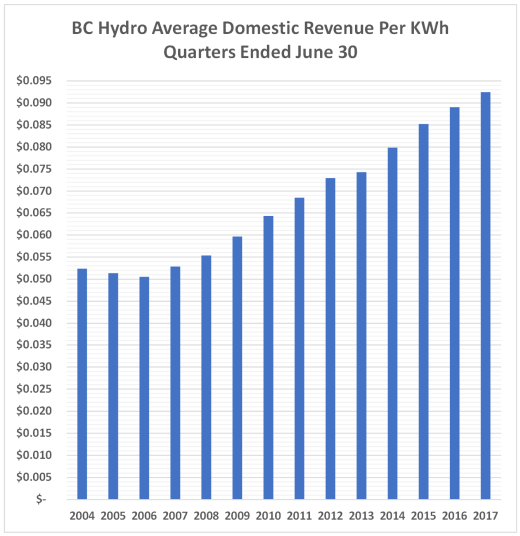There is an interesting note in BC Hydro’s quarterly report issued in mid October for the period ended June 30, 2017:
These interim financial statements were approved on behalf of the Board of Directors on August 24, 2017.
By law (Budget Transparency and Accountability Act, Section 10(3)), BC Hydro was required to make public its most recent quarterly financials on or before September 15.
It did not.
As a result, Section 17 of the same act imposed a duty on Michelle Mungall, Minister of Energy, Mines and Petroleum Resources:
If a document required to be made public under this Act
(a) is not made public within the required time,
…then, at the time the document is required to be made public, the responsible minister must make public a written statement giving the reasons for the non-compliance.
The Minister gave no such statement and her ministry made no response to my request for the required document.
BC Hydro stated that its quarterly financial statements were approved by the Board on August 24. Yet, despite the statute, these were withheld until October 16, the first business day following the end of public hearings before the BC Utilities Commission’s Site C examination.
There seems to be only one reason for BC Hydro’s action. I presume it is explained by fears that a fully informed citizenry would more effectively dispute the need for Site C.
The quarterly report revealed that, despite BC Hydro’s statements to the contrary, demand for electricity is not growing and remains the same as it was in the same period of 2004. The crown corporation has been dishonest about this fact in its public announcements yet the financial records show my statements about demand are true.

The amount of energy needed from BC Hydro’s own facilities to serve the needs of British Columbia has declined over the last ten years. This is the result of the Liberal Government forcing private power purchases.

Even though the requirment for internally generated capacity has sagged, BC Hydro has been adding capacity to its own system. (Capacity is the maximum output a generator can produce at one moment in time. The amount of electricity a hydro generator produces over a year is determined by water flows, mechanical availability and decisions or the operator.)

I’ve disputed BC Hydro’s policy toward private power. The utility met most demand from its own generators in 2004 while it bought 1,452 GWh from Independent Power Producers (IPPs). (Burrard Thermal, now closed, provided an average of 38 GWh monthly in that fiscal year.)
In the quarter ended June 30, 2017, BC Hydro bought 4,203 GWh from IPPs and sold less electricity to its domestic customers than in the same quarter in 2004. That meant a significantly less volume of electricity was required from the crown corporation’s generators, even though an additional 16% had been added to capacity between 2004 and 2017.
The utility loses money on every watt of private power it buys and resells. That is the single largest financial difficulty faced by the company. In the future, it is obliged to buy about $60 billion of electricity from IPPs at prices that will increase with inflation.
There are a few regional justifications but there is no pressing need for most of the IPP production. But, the obligation for its purchase cripples BC Hydro since surplus power cannot be profitably resold.
By the way, the following chart reflects average revenues received by BC Hydro over time. The impact of private power on the cost of electricity is apparent. Years of stable pricing ending in 2007.

Generation of electricity: the next significant industry for BC’s interior relies on the same natural resource as viniculture: sunlight. #bcpoli #SiteC
— Norm Farrell (@Norm_Farrell) October 29, 2017
https://platform.twitter.com/widgets.js
Categories: BC Hydro, Independent Power Producers (IPP)




I’m happy to pay a fair price for power from publicly-owned BC Hydro, whose major infrastructure was built and paid for years ago.
I’m not happy about having to pay extra for my hydro power because, thanks to the BC Liberals, BC Hydro was conned into buying over $56 billion worth of intermittent power from IPPs such as ruin-of-river projects, the power from which BC Hydro apparently doesn’t actually need, but is paying a fortune for.
LikeLiked by 1 person
Somehow the Liberal Opposition blames the NDP Govt for BC Hydro financial woes and rate hikes:
http://vancouversun.com/news/local-news/b-c-government-puts-a-freeze-on-b-c-hydro-rates
LikeLiked by 1 person
“The IPPs BC Hydro was forced to buy are for the most part surplus to B.C. requirements and are being sold at great loss on the export market. The average cost of the IPPs BC Hydro was forced to buy in the last “Clean Call” for energy was over $125/MWh. That energy is currently being sold for some $25 to $30/MWh. The loss on the IPP purchases forced by the Clean Energy Plan is currently hundreds of millions of dollars per year.”
from:
https://thetyee.ca/Opinion/2017/11/07/bc-liberals-clean-energy-plan/
LikeLiked by 1 person
And that thing where parts of BC Hydro were privatized to Accenture in 2002, the deal being made ‘exempt from common law’. What kind of crap is that?
And what was the link between Accenture and Arthur Andersen, Enron’s accounting firm?
LikeLike
The generating capacity table is listed in MWh, do you mean MW? If the heading is correct, then we under-generate by a factor of 20 or so…
LikeLike
Thanks, you are correct. The chart is now corrected.
LikeLike
A publicly-owned electricity utility, run for the benefit of the public. I’m ok with that.
Maybe we can get it back.
LikeLike
Why???!
Why, you have to ask why the BC Liberals would PURPOSELY BANKRUPT BC HYDRO?????
Everyone who followed this IPP Proposal from the beginning KNEW this was gonna destroy this taxpayer owned asset but the mainstream media basically ignored the obvious malfeasance that was going on. But WHY? That’s what I want to know.
LikeLike
Easy! So it could be “sold” like BC Rail.
LikeLike
One wonders if less effort was put into hiding how IPP payouts are bankrupting the company and more effort into solving the financial problems wouldn’t have been in the best interests of ratepayers. Cover ups seem to absorb time that managers should be using to keep rates low at the utility. Although most of the problems come from political interference. JM was not a utility executive.
LikeLike
It could be that the US market is again profitable for Canadian energy exports after Trump’s minions strip away 40 years of libertarian economics:
https://www.theregreview.org/2017/10/26/pierce-energy-tariff-disastrous/
LikeLike
In June 2014 Vaughn Palmer argued incoming CEO Jessica McDonald wasn’t being paid enough because she was in the best position to fix the problems at BC Hydro “from the excessive resort to deferral accounts, to artificially low rates, to the dubious requirement for energy self-sufficiency, to deliberate avoidance of scrutiny by the independent utilities commission.”
http://www.nationalpost.com/m/vaughn+palmer+hydro+political+savvy+gives+crown/9904547/story.html
Three years later, with those problems arguably worse, he says Jessica McDonald was fired as a “political hit job”, “one of the most accomplished women in the provincial public sector” was tossed “onto the ash heap” and there’s “every likelihood that she’d land a position elsewhere that will make Horgan look ridiculous.”
http://vancouversun.com/opinion/columnists/vaughn-palmer-horgan-goes-headhunting-to-fire-hire-hydro-leader
I think Vaughn has a crush on Jessica.
LikeLiked by 1 person
Thanks Norm, keep up the good work.
LikeLike
This mess will take years if ever to clean up. The task before our new government must be overwhelming and hopefully in time they will have a clearer picture of the damage done by BBLibs.They should hire Norm Farrel as chief investigator.
LikeLike